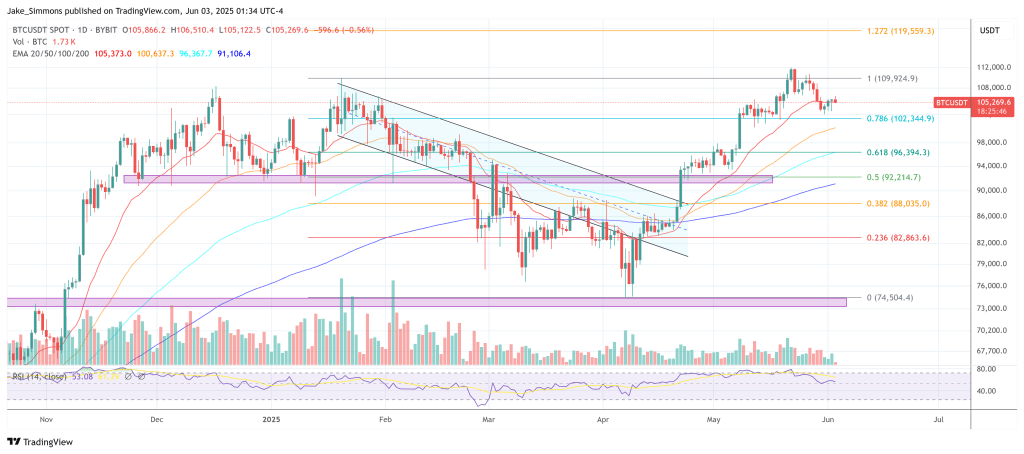So, Russia just did it. Sberbank, Russia’s largest (and state-run, because why not?) universal bank, has decided that the best way to make its mark in the digital age is by launching structured bonds that are linked to Bitcoin‘s value in US dollars and the value of the ruble. But don’t worry, it’s “regulated,” so it’s perfectly official. The good news? You don’t need a crypto wallet, and you won’t even have to bother with those pesky “unregulated foreign platforms.” You’re welcome, Russia!
Russia Launches Bitcoin Linked Bonds
In an announcement that dropped on 30 May (yes, that was recent enough for you to still be figuring out how you feel about it), Sberbank explained that these new notes are denominated in rubles, settled entirely within the Russian clearing and depository system, and will allow qualified investors to “earn income from future US-dollar value changes in Bitcoin and from a potential US-dollar strengthening against the ruble.” Think of it as the kind of bond that gets you exposure to cryptocurrency but, you know, without actually touching it. How convenient!
Now, to start off, these securities will be sold over-the-counter to a select group of investors who can presumably use terms like “qualified” and “accredited” in their sleep. But don’t worry, Sber plans to list future batches on the Moscow Exchange (MOEX) so that it’s all transparent, liquid, and easily accessible for “qualified” investors (again, you’ll need to fit that bill).
Oh, and in case you’re wondering, this is happening the same day Sber’s new cash-settled Bitcoin futures will launch on its SberInvestments platform. Could be fun, right?
Here’s the kicker—this all comes just after the Bank of Russia decided to loosen its chokehold on crypto-linked financial products. The government is now letting brokers and exchanges deal in non-deliverable derivatives and structured products tied to digital assets—provided no physical crypto changes hands. (Because, obviously, touching Bitcoin is so last year.)
Sber’s deputy chairman Anatoly Popov, in an impressively high-sounding statement, said the bonds were designed to give investors “convenient and secure exposure to cryptocurrency assets—without actual ownership of cryptocurrency.” Translation: You get all the fun of crypto speculation, with none of the mess of actually owning it. Bravo, Sber!
Let’s not forget—Sber’s approach to crypto is nothing new. They’ve been fiddling around with blockchain, testing out a ruble-pegged “Sbercoin,” and even integrating MetaMask. So, they’ve been positioning themselves as the “domestic champions” of tokenized finance, even though international sanctions have made their foreign operations a bit… tricky.
The bond structure itself is a synthetic call spread. What does that mean? It’s essentially a coupon payment based on how much Bitcoin’s price changes over a set period of time, combined with any dollar-to-ruble exchange rate changes. Of course, there are caps—because heaven forbid this get too exciting. All settlement will happen in rubles, so you’re safe from the complexities of Bitcoin taxes and custodial nightmares. It’s all about keeping it nice and simple, folks.
The US Falls Behind (But Could Still Win)
Now, if you’re thinking, “Well, that sounds neat! Surely, the US is already doing something similar…” Well, you’d be wrong. In fact, the US is still over there scratching its head and debating whether they should even allow Bitcoin to sit at the grown-up table. While Russia’s Sberbank is playing the game and winning, the US is still doodling diagrams on napkins. Oh, dear.
Market experts are calling Sber’s new product a “game-changer” for Bitcoin. Marty Bent, podcast host, remarked that BitBonds (the term for these structured bonds) are going to do wonders for Bitcoin by giving investors “certainty” about Bitcoin being out of circulation for a certain period. That sounds like a really long way of saying: “We’re locking Bitcoin up so it’s not circulating—trust us, it’s smart!”
In the geopolitical commentary corner, British HODL (because why not have a secretive online name) pointed out that Russia has quietly rolled out its BitBonds while the USA continues to bumble along. Meanwhile, analyst Justin Bechler argues that this product gives BRICS countries “instant access to Bitcoin exposure with zero friction.” Translation: Russia’s making moves, while the US is busy pretending that Bitcoin is just a phase.
Bitcoin Magazine CEO David Bailey summed it up perfectly: “We need BitBonds in America now. Like, now now.” At least someone’s being honest about it.
In Washington, the idea of BitBonds is still just a twinkle in some wonky economist’s eye. The Bitcoin Policy Institute (BPI) has floated the idea of issuing Bitcoin-enhanced treasury bonds (aka BitBonds) with a 1% coupon. These bonds would use some of the proceeds to buy Bitcoin for the US Treasury’s newly proposed “Strategic Bitcoin Reserve.” Sound like a good idea? Well, that’s up for debate—because the whole thing is still just theoretical, and Treasury officials aren’t exactly rushing to comment. So, we’re still waiting for action here, folks. Maybe in another year or two?
Ultimately, both Russia’s new bonds and the US’s BitBond plan aim to do the same thing: integrate Bitcoin into the bond market. But while Russia is offering price exposure through a ruble-denominated note, the US wants to hoard Bitcoin like it’s the new gold. Who’s right? Well, that’s anyone’s guess.
As of right now, Bitcoin is sitting at a comfortable $105,269. A far cry from when it was just a little hobby project for nerds!

Read More
- Clash Royale Best Boss Bandit Champion decks
- Vampire’s Fall 2 redeem codes and how to use them (June 2025)
- Mobile Legends January 2026 Leaks: Upcoming new skins, heroes, events and more
- World Eternal Online promo codes and how to use them (September 2025)
- How to find the Roaming Oak Tree in Heartopia
- Best Arena 9 Decks in Clast Royale
- Clash Royale Season 79 “Fire and Ice” January 2026 Update and Balance Changes
- Clash Royale Furnace Evolution best decks guide
- Clash Royale Witch Evolution best decks guide
- Best Hero Card Decks in Clash Royale
2025-06-03 14:47